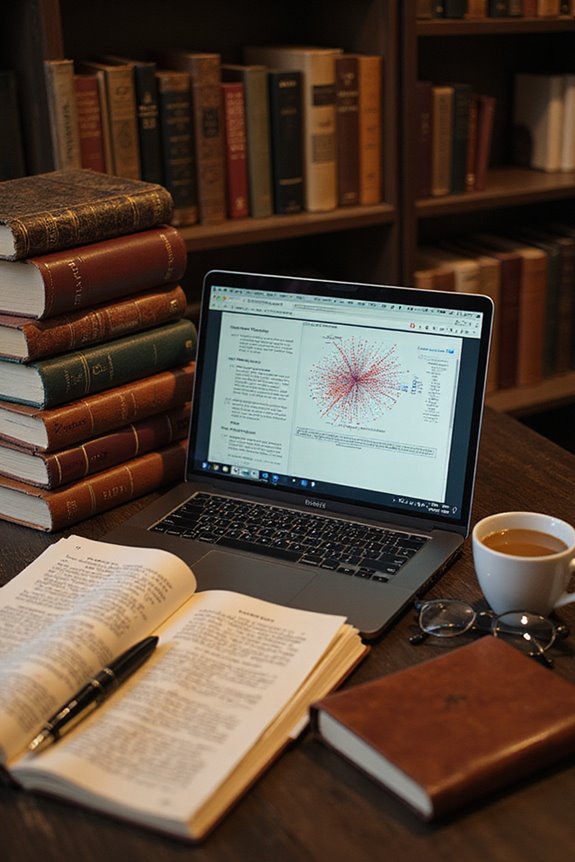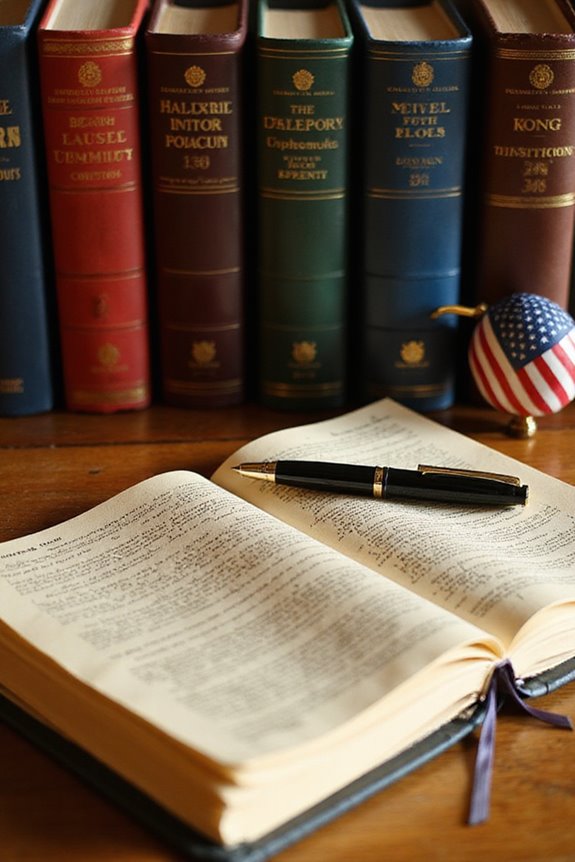When exploring highly cited political science books, we find key texts shaping our understanding of governance and democracy. Among the foundational works are:
- Plato’s *The Republic*
- Machiavelli’s *The Prince*
- Hobbes’ *Leviathan*
Contemporary books, like Anne Applebaum’s *Twilight of Democracy*, highlight modern challenges. Citation trends show a decline in book references but emphasize the relevance of prestigious university presses. These books provide insights into power dynamics and political theory. More on their specific contributions follows.
Key Takeaways
- Foundational works like Plato’s *The Republic* and Machiavelli’s *The Prince* continue to influence contemporary political thought and discourse.
- Contemporary books such as *Twilight of Democracy* and *The People vs. Democracy* address modern challenges to liberal democracy and authoritarianism.
- Citation trends show a decline in book citations over the last 25 years, particularly in American politics.
- The WoS Book Citation Index aims to improve the assessment of scholarly communication by connecting book citations to other research.
- Prestigious university presses play a crucial role in maintaining the relevance of highly cited political science books.
Foundational Works in Political Science
Foundational works in political science serve as the bedrock of our understanding of governance, power, and societal structure. These texts have shaped our notions of political idealism and state sovereignty.
- Plato’s *The Republic* explores justice and the ideal state, emphasizing the philosopher-king’s role. This work remains pivotal in discussions about democratic insights and the role of governance in promoting virtue.
- Machiavelli’s *The Prince* contrasts idealism by adopting a pragmatic approach focused on power and political expediency.
- Hobbes’ *Leviathan* introduces social contract theory, arguing for absolute sovereignty to maintain order.
- Locke’s *Second Treatise of Government* counters Hobbes, advocating for limited government and natural rights.
- Marx’s *The Communist Manifesto* critiques capitalism, highlighting class struggle and economic power dynamics.
These foundational texts continue to influence modern political thought and practices, shaping our understanding of governance today. Additionally, they reflect the historical evolution of political ideologies, which is crucial for comprehending contemporary political landscapes.
Highly Cited Contemporary Books in Political Science

In recent years, we’ve seen a surge of highly cited contemporary books in political science that explore pressing issues like authoritarianism and democracy. Notable works include:
- *Twilight of Democracy* by Anne Applebaum, which examines challenges to liberal democracy from rising authoritarian populism.
- *The Narrow Corridor* by Daron Acemoglu and James Robinson, focusing on the critical state-society tension for liberty’s survival.
- *The People vs. Democracy* by Yascha Mounk, analyzing threats to democratic institutions and offering insights on authoritarian resilience.
These influential texts contribute greatly to our understanding of contemporary democracy and democratic backsliding. They combine political theory, historical analysis, and case studies, enriching debates about democracy’s future and the ongoing challenges faced by liberal institutions worldwide. The rise of authoritarian populism serves as a crucial backdrop for these discussions, highlighting the urgent need for informed public discourse to combat these threats. Additionally, many scholars emphasize the importance of understanding electoral integrity to ensure fair democratic processes in the face of such challenges.
Most Cited Books Across Social Sciences Relevant to Political Science

When considering the most cited books across the social sciences that are relevant to political science, we find a diverse range of influential texts.
- Thomas Kuhn’s The Structure of Scientific Revolutions offers insights into paradigm shifts, impacting political science considerably.
- John Rawls’s A Theory of Justice lays foundational theories on justice, widely cited across disciplines.
- Clifford Geertz’s The Interpretation of Cultures informs our understanding of culture in politics.
- Works by Marx and Engels remain central in political theory and sociology.
- Mark Granovetter’s “The Strength of Weak Ties” influences political network analysis.
- This analysis reveals that the top cited books in social sciences often intersect with political thought, emphasizing the significance of interdisciplinary discourse. Additionally, classic writings from influential thinkers like Plato and Locke continue to shape contemporary political theory.
This citation analysis highlights the interdisciplinary impact foundational texts have on political science, reflecting the interconnected nature of social sciences.
Citation Trends and Impact Metrics

As we explore citation trends and impact metrics in political science, it’s essential to recognize how these patterns shape our understanding of scholarly influence.
- Citation methodologies vary greatly between books and articles; articles are mostly cited by other articles, while books receive citations from both formats.
- Over the last 25 years, there’s been a notable decline in book citations, especially in American politics, while article citations have surged. This trend highlights the need for broader engagement with political theory to ensure diverse scholarly contributions are recognized.
- Many popular impact metrics overlook book citations, leading to an incomplete picture of scholarly communication. The WoS Book Citation Index BKCI aims to address this issue by connecting citations in books to other scholarly research.
- To accurately assess influence, we recommend utilizing both article and book citations.
- Prestigious university presses contribute greatly to highly cited political science books, ensuring their ongoing relevance in research dissemination.
This thorough approach facilitates a more balanced understanding of scholarly impact in our field.
Influential Themes in Cited Political Science Books

Influential themes in cited political science books reveal the depth and breadth of scholarly discourse within the field.
- Political Ambition: Works like *All the King’s Men* explore the moral consequences of ambition and corruption in leadership.
- Authoritarian Regimes: Texts such as *The Handmaid’s Tale* critique gender oppression and the suppression of women by authoritarian systems. The exploration of totalitarian regimes in literature often serves as a cautionary tale about the fragility of freedom.
- Civic Engagement: Studies by Almond and Verba emphasize the importance of political participation for sustaining democracy and civic virtue.
- Gender Oppression: Various narratives illustrate how authoritarian regimes manipulate gender roles to maintain control, highlighting the intersection of power and societal structures.
These themes collectively enhance our understanding of political dynamics and the ethical challenges within governance, shaping the discourse in political science.
Classic vs. Modern Influence in Political Science Books
Classic authors emphasize justice, democracy, and state power, shaping the discourse around political theory. In contrast, modern books increasingly utilize empirical methodologies, reflecting the behavioral revolution in political science. Contemporary texts, such as Larry Bartels’ Unequal Democracy, analyze political behavior through large datasets. This shift towards data-driven insights distinguishes modern literature, which incorporates interdisciplinary approaches and addresses real-world implications, highlighting the growing importance of citation analysis in understanding academic influence. Additionally, the incorporation of historical context in contemporary analyses helps bridge the gap between theory and practice, ensuring that both classic and modern works remain highly cited, each contributing uniquely to the evolving landscape of political science.
The Role of Justice and Fairness in Political Theory
Key elements of his framework include:
- Maximal Basic Liberties: Ensuring everyone has equal liberty.
- Difference Principle: Allowing inequalities only if they benefit the least advantaged.
These principles guide our examination of societal roles and institutional structures. Rawls’s work transforms justice from merely an ethical concern into a pivotal political theory. The original position serves as a foundational thought experiment that reinforces the impartiality of his principles.
His refinements in later essays address contemporary issues, maintaining the relevance of justice as fairness. This evolving yet consistent framework continues to influence political philosophy, highlighting the importance of equitable access to resources and opportunities for all.
Democracy and Inequality in Contemporary Research
How does economic inequality impact the health of democracies today? Rising inequality undermines democracy resilience through various mechanisms:
- Inequality effects lead to increased polarization, diminishing political participation among lower-income citizens.
- A lack of institutional trust emerges when government fails to support those affected by economic change. This lack of trust is often exacerbated by widening wealth gaps, which can alienate diverse demographic groups from the political process.
- This distrust contributes to the rise of populism, as citizens seek alternatives to traditional parties.
- Systematic underrepresentation occurs, resulting in skewed policy outcomes favoring the affluent.
- Civic engagement dwindles due to practical barriers faced by low-income voters, limiting their influence.
- Ultimately, the polarization impact creates a cycle that widens economic disparities, further eroding democratic ideals of economic justice and fair voter representation.
Power Dynamics in International Relations Literature
Understanding power dynamics in international relations is essential for analyzing global interactions. Key texts in this field highlight several foundational theories:
- Hans Morgenthau’s *Politics Among Nations* establishes classical realism, emphasizing power as vital to state behavior.
- John J. Mearsheimer’s *The Tragedy of Great Power Politics* illustrates inevitable power competition in an anarchic system.
- Kenneth Waltz’s *Theory of International Politics* shifts focus to structural power distribution.
Additionally, Joseph Nye’s concept of *soft power* demonstrates the importance of ideological influence beyond military might. Furthermore, the analysis of state behavior and war reveals how states act under the pressures of an anarchic international order.
Frequently Asked Questions
What Criteria Determine a Book’s Citation Count in Political Science?
When conducting citation analysis, we see that a book’s publication impact hinges on its originality, author reputation, and relevance. For instance, a recent work on climate policy often garners high citations due to its timeliness.
How Do Political Science Citations Compare Across Different Academic Disciplines?
When we look at disciplinary comparisons, citation metrics reveal that political science generally lags behind fields like psychology and economics, showcasing unique challenges in citation practices and the types of sources we often rely on.
Are There Notable Political Science Books That Are Frequently Overlooked?
Did you know that over 60% of political science syllabi miss key texts? We should explore overlooked classics and hidden gems like Tocqueville and Orwell, which offer profound insights yet remain underappreciated in our academic discussions.
What Databases Are Best for Tracking Political Science Publications?
When tracking political science publications, we recommend using Google Scholar for broad searches and JSTOR for accessing archived scholarly articles. Both platforms provide valuable resources for extensive research in our field.
How Do Citation Trends Influence Political Science Research Funding?
As we navigate the intricate web of research, we see citation trends painting a landscape that influences funding allocation. Higher citation impact can open doors, but biases often cloud the horizon, affecting opportunities for all scholars.







